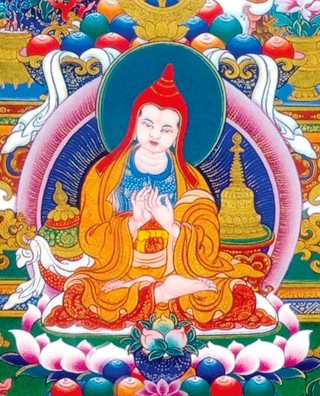Atisha: Difference between revisions
No edit summary |
No edit summary |
||
| (51 intermediate revisions by 9 users not shown) | |||
| Line 1: | Line 1: | ||
[[image:Atisha.JPG|frame|'''Jowo Jé Glorious Atisha''']]'''Atisha''' (982-1054) was a great Indian master and scholar, and author of many | [[image:Atisha.JPG|frame|'''Jowo Jé Glorious Atisha''']] | ||
'''Atisha Dipamkara Shrijñana''' (Skt. ''Atiśa Dīpaṃkara Śrījñāna'', or ''*Adhīśa''; Tib. ཨ་ཏི་ཤ་མར་མེ་མཛད་དཔལ་ཡེ་ཤེས་, ''Atisha Marmézé Pal Yeshé'', [[Wyl.]] ''a ti sha mar me mdzad dpal ye shes'') or '''Jowo Jé Palden Atisha''' (ཇོ་བོ་རྗེ་དཔལ་ལྡན་ཨ་ཏི་ཤ་, Wyl. ''jo bo rje dpal ldan a ti sha'') (982-1054) was a great Indian master and scholar, and author of many texts including the ''[[Lamp for the Path of Awakening]]''. One of the main teachers at the famous university of [[Vikramashila]], he was also a strict follower of the monastic rule and was widely acclaimed for the purity of his teaching. He arrived in Tibet in 1042 and spent the last ten years of his life there, teaching and translating texts, and was instrumental in reinvigorating [[Buddhism]] there after a period of persecution. His disciples founded the [[Kadampa]] school. | |||
==Writings== | |||
*[[Lamp for the Path of Awakening]] | |||
*{{LH|indian-masters/atisha/jewel-rosary-bodhisattvas|''The Bodhisattva’s Garland of Jewels''}} | |||
==Main Disciples== | |||
Chief among Atisha's Tibetan disciples were the three known as "Khu, Ngok, and Drom," who were renowned as emanations of the three main bodhisattvas—[[Avalokiteshvara]], [[Manjushri]], and [[Vajrapani]]: [[Khutön Tsöndru Yungdrung]], [[Ngok Lekpé Sherab]] and [[Dromtön Gyalwé Jungné]]. | |||
==Further Reading== | |||
*Chattopadhyaya, Alaka. ''Atisha and Tibet''. Calcutta: Indian Studies Past and Present, 1967. | |||
*Decleer, Hubert. 'Atisha's Journey to Sumatra', in ''Buddhism in Practice'', edited by Donald S. Lopez Jr., Princeton University Press, 1995 | |||
*Decleer, Hubert. 'Atisha's Journey to Tibet', in ''Religions of Tibet in Practice'', edited by Donald S. Lopez Jr., Princeton University Press, 1997 | |||
*Eimer, Helmut. 'The Development of the Biographical Tradition concerning Atisa (Dipamkarasrijnana)' in ''The Journal of the Tibet Society'', Vol. 2 (1982), pp. 41-51 | |||
*Seyfort Ruegg, David. ''The Literature of the Madhyamaka School of Philosophy in India'', Wiesbaden: Harrassowitz, 1981, pp. 110-113 | |||
*Sherburne, Richard, trans. ''The Complete Works of Atiśa Śrī Dīpaṃkara Jñāna''. New Delhi: Aditya Prakashan, 2000. | |||
==Internal Links== | |||
*[[Ka khol ma]], ''The Pillar Testament''. | |||
*[[Quotations: Indian Masters#Atīśa|Quotations from Atīśa's works.]] | |||
==External Links== | |||
*{{LH|indian-masters/atisha/jewel-rosary-bodhisattvas|''The Bodhisattva’s Garland of Jewels''}} by Atisha | |||
*{{TBRC|P3379|TBRC Profile}} | |||
*{{84000|http://read.84000.co/section/O1JC76301JC11278.html|Works of Atiśa}} | |||
*[http://www.treasuryoflives.org/biographies/view/Atisha-Dipamkara/5717 Biography at Treasury of Lives] | |||
[[Category:Historical Masters]] | [[Category:Historical Masters]] | ||
[[Category:Indian Masters]] | |||
[[Category:Seventeen Nalanda Masters]] | |||
Latest revision as of 04:37, 19 October 2023

Atisha Dipamkara Shrijñana (Skt. Atiśa Dīpaṃkara Śrījñāna, or *Adhīśa; Tib. ཨ་ཏི་ཤ་མར་མེ་མཛད་དཔལ་ཡེ་ཤེས་, Atisha Marmézé Pal Yeshé, Wyl. a ti sha mar me mdzad dpal ye shes) or Jowo Jé Palden Atisha (ཇོ་བོ་རྗེ་དཔལ་ལྡན་ཨ་ཏི་ཤ་, Wyl. jo bo rje dpal ldan a ti sha) (982-1054) was a great Indian master and scholar, and author of many texts including the Lamp for the Path of Awakening. One of the main teachers at the famous university of Vikramashila, he was also a strict follower of the monastic rule and was widely acclaimed for the purity of his teaching. He arrived in Tibet in 1042 and spent the last ten years of his life there, teaching and translating texts, and was instrumental in reinvigorating Buddhism there after a period of persecution. His disciples founded the Kadampa school.
Writings
Main Disciples
Chief among Atisha's Tibetan disciples were the three known as "Khu, Ngok, and Drom," who were renowned as emanations of the three main bodhisattvas—Avalokiteshvara, Manjushri, and Vajrapani: Khutön Tsöndru Yungdrung, Ngok Lekpé Sherab and Dromtön Gyalwé Jungné.
Further Reading
- Chattopadhyaya, Alaka. Atisha and Tibet. Calcutta: Indian Studies Past and Present, 1967.
- Decleer, Hubert. 'Atisha's Journey to Sumatra', in Buddhism in Practice, edited by Donald S. Lopez Jr., Princeton University Press, 1995
- Decleer, Hubert. 'Atisha's Journey to Tibet', in Religions of Tibet in Practice, edited by Donald S. Lopez Jr., Princeton University Press, 1997
- Eimer, Helmut. 'The Development of the Biographical Tradition concerning Atisa (Dipamkarasrijnana)' in The Journal of the Tibet Society, Vol. 2 (1982), pp. 41-51
- Seyfort Ruegg, David. The Literature of the Madhyamaka School of Philosophy in India, Wiesbaden: Harrassowitz, 1981, pp. 110-113
- Sherburne, Richard, trans. The Complete Works of Atiśa Śrī Dīpaṃkara Jñāna. New Delhi: Aditya Prakashan, 2000.
Internal Links
- Ka khol ma, The Pillar Testament.
- Quotations from Atīśa's works.